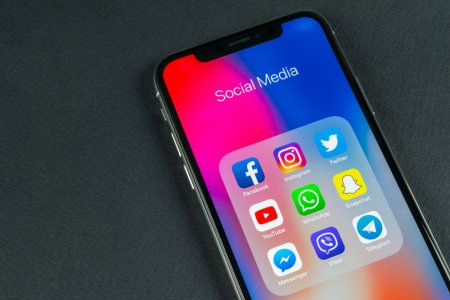Small businesses face uphill battle against Meta as hacked social media accounts increase
By
Seia Ibanez
- Replies 11
As the digital age continues to evolve, small businesses have increasingly turned to social media platforms like Facebook and Instagram to reach their customers and grow their brands.
These platforms, owned by Meta, have become essential tools for marketing and customer engagement.
However, with the rise of online presence comes the heightened risk of cyber threats, and Australian businesses feel the brunt of this digital dilemma.
Catherine Wilson, a Melbourne gym owner and martial artist, is no stranger to combat.
Yet, her most formidable adversary has turned out to be the tech giant Meta as she grapples with the repercussions of her business's Facebook account being hacked.

For nine gruelling months, Wilson has been fighting to regain control of her account.
It is a total s**tshow,’ she said.
‘I'm a mum of two kids, my partner is doing it as well, and we were just forced into doing it all hours of the day trying to get this resolved, it's been a huge burden.’
Wilson's ordeal is not an isolated incident.
Across Australia, there has been a surge in complaints against Meta, with a staggering 120 per cent increase in small business cases since July 2022.
The Albanese government has not shied away from criticising the tech giant for allowing scams to run rampant.
The frustration among hacked account holders is palpable.
Many reported that Meta's customer support feels like a ‘black hole’, offering generic responses and making it nearly impossible to reach a real person.
This has led to calls for new regulations that would compel digital platforms to take action and impose hefty fines for non-compliance.
Wilson's experience is a cautionary tale for all small business owners.
After being locked out of her gym's Facebook pages in July 2023, she faced a fraudulent $20,000-per-day ad campaign called ‘Hot Trend Today’ and struggled to find meaningful help from Meta.
‘It made me feel sick when I realised that we were hacked,’ she recounted.
‘The process of what played out afterwards, I felt trapped and very small.’
Despite her efforts to secure her accounts with extra measures like two-factor authentication, the hackers struck again, leading to the permanent deletion of her personal Facebook account and a significant loss of business revenue.
‘There's no other business that would be able to provide a service to Australian small businesses and behave in this way,’ she said.
The outcry against Meta is not limited to Australia.
Representatives from 40 states in the United States have expressed their concerns about the company's failure to prevent account takeovers and provide adequate customer support.
The letter stated, ‘The frequency and persistence of account takeovers on Meta-owned platforms puts it in a league of its own.’
For artists like Brisbane's Giles Kilham, who rely on Instagram to sell their work, the impact of a hacked account can be devastating.
Two years ago, he fell victim to a phishing scam in which hackers sent him a phishing message pretending to be someone else.
Kilham lost access to his account and, with it, his customer base and engagement.
It also appeared his account had been deleted, which left him no choice but to start from scratch.
‘Dealing with Meta was frustrating,’ Kilham said. ‘It just goes into some abyss, and you never hear anything again.’
‘They asked for assistance (and) I unwittingly gave the hackers the ability to get into my account and change my password and throw me out.’
The Small Business Ombudsman, Bruce Billson, has noted that disputes involving digital platforms like Meta's are the fastest-growing area his agency is handling.
He said there have been 140 cases in the past six months about Meta.
‘We are a taxpayer-funded resource and this really should be sorted out at the platform long before we need to get involved,’ Billson said.
Even with a direct line to Meta, resolving these issues can be a slow and frustrating process.
As the government drafts a new mandatory code to impose obligations on social media platforms to protect customers against scams, consumer advocates are pushing for financial penalties for non-compliance.
Meta was unavailable for an interview to comment on this matter and did not respond to the questions.
‘We don’t have anything further to add to your story,’ a company spokesperson said.
Wilson has been calling for change as she claimed the ‘power imbalance is obvious’.
'We're begging for assistance to get back onto this platform that we now hate,’ she said.
Meta announced in November that companies using Facebook or Instagram may subscribe to ‘Meta Verified,’ a tool for verifying their legitimacy.
The aim is to inspire confidence in consumers encountering a business online for the first time, with a verification badge denoting authenticity.

What are your thoughts on this story, members? What do you do to keep your social media accounts safe? Let us know in the comments below!
These platforms, owned by Meta, have become essential tools for marketing and customer engagement.
However, with the rise of online presence comes the heightened risk of cyber threats, and Australian businesses feel the brunt of this digital dilemma.
Catherine Wilson, a Melbourne gym owner and martial artist, is no stranger to combat.
Yet, her most formidable adversary has turned out to be the tech giant Meta as she grapples with the repercussions of her business's Facebook account being hacked.

Small businesses faced challenges as their social media accounts were being hacked. Credit: Shutterstock
For nine gruelling months, Wilson has been fighting to regain control of her account.
It is a total s**tshow,’ she said.
‘I'm a mum of two kids, my partner is doing it as well, and we were just forced into doing it all hours of the day trying to get this resolved, it's been a huge burden.’
Wilson's ordeal is not an isolated incident.
Across Australia, there has been a surge in complaints against Meta, with a staggering 120 per cent increase in small business cases since July 2022.
The Albanese government has not shied away from criticising the tech giant for allowing scams to run rampant.
The frustration among hacked account holders is palpable.
Many reported that Meta's customer support feels like a ‘black hole’, offering generic responses and making it nearly impossible to reach a real person.
This has led to calls for new regulations that would compel digital platforms to take action and impose hefty fines for non-compliance.
Wilson's experience is a cautionary tale for all small business owners.
After being locked out of her gym's Facebook pages in July 2023, she faced a fraudulent $20,000-per-day ad campaign called ‘Hot Trend Today’ and struggled to find meaningful help from Meta.
‘It made me feel sick when I realised that we were hacked,’ she recounted.
‘The process of what played out afterwards, I felt trapped and very small.’
Despite her efforts to secure her accounts with extra measures like two-factor authentication, the hackers struck again, leading to the permanent deletion of her personal Facebook account and a significant loss of business revenue.
‘There's no other business that would be able to provide a service to Australian small businesses and behave in this way,’ she said.
The outcry against Meta is not limited to Australia.
Representatives from 40 states in the United States have expressed their concerns about the company's failure to prevent account takeovers and provide adequate customer support.
The letter stated, ‘The frequency and persistence of account takeovers on Meta-owned platforms puts it in a league of its own.’
For artists like Brisbane's Giles Kilham, who rely on Instagram to sell their work, the impact of a hacked account can be devastating.
Two years ago, he fell victim to a phishing scam in which hackers sent him a phishing message pretending to be someone else.
Kilham lost access to his account and, with it, his customer base and engagement.
It also appeared his account had been deleted, which left him no choice but to start from scratch.
‘Dealing with Meta was frustrating,’ Kilham said. ‘It just goes into some abyss, and you never hear anything again.’
‘They asked for assistance (and) I unwittingly gave the hackers the ability to get into my account and change my password and throw me out.’
The Small Business Ombudsman, Bruce Billson, has noted that disputes involving digital platforms like Meta's are the fastest-growing area his agency is handling.
He said there have been 140 cases in the past six months about Meta.
‘We are a taxpayer-funded resource and this really should be sorted out at the platform long before we need to get involved,’ Billson said.
Even with a direct line to Meta, resolving these issues can be a slow and frustrating process.
As the government drafts a new mandatory code to impose obligations on social media platforms to protect customers against scams, consumer advocates are pushing for financial penalties for non-compliance.
Meta was unavailable for an interview to comment on this matter and did not respond to the questions.
‘We don’t have anything further to add to your story,’ a company spokesperson said.
Wilson has been calling for change as she claimed the ‘power imbalance is obvious’.
'We're begging for assistance to get back onto this platform that we now hate,’ she said.
Meta announced in November that companies using Facebook or Instagram may subscribe to ‘Meta Verified,’ a tool for verifying their legitimacy.
The aim is to inspire confidence in consumers encountering a business online for the first time, with a verification badge denoting authenticity.
Key Takeaways
- A Melbourne gym owner has been engaged in a nine-month struggle with Meta to regain access to her hacked Facebook business account, which has had a significant financial impact on her business.
- Victims of hacks on Meta platforms have found it difficult to obtain support, with many receiving generic responses and facing challenges in getting assistance from the company.
- The Australian Small Business Ombudsman has reported a fast-growing number of disputes involving digital platforms like Meta.
- There are calls for stronger regulatory measures and potential financial penalties for social media companies failing to protect their users.








